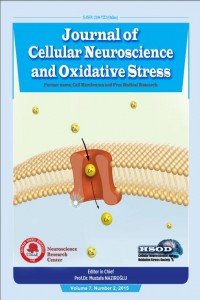Abstract
References
- Alkan A, Eroglu F, Eroglu E, Ergin C, Cerci C. Alsancak G. 2006. Protective effects of N-acetylcysteine and erdosteine on hemorrhagic shock-induced acute lung injury. Eur J Emerg Med 13, 281-285. Bachofen M, Weibel ER. 1982. Structural alterations of lung parenchyma in the adult respiratory distress syndrome. Clin Chest Med 3, 35-56. Bernard GR. 1991. N-acetylcysteine in experimental and clinical acute lung injury. Am J Med 91, 54S-59S
The Effects of Delayed Fluid Resuscitation on Lung Oxidative Stress and Antioxidant Vitamin Levels in Controlled Hemorrhagic Shock: An Experimental Study
Abstract
We aimed to determine the effects of delayed
fluid resuscitation on the lung oxidative stress and antioxidant vitamin levels
in a rat model of controlled hemorrhagic shock (HS). Male Wistar rats were exposed to controlled HS via
arterial catheterization to reduce mean arterial pressure (MAP) to 40 mmHg over
10 minutes. Two groups were constituted
according to resuscitation time: early (n=6) and delayed (n=5), respectively
resuscitated 30 or 90 minutes after HS. A control group (n=5) was subjected to
catheterization only. Intravenous fluid resuscitation was done with Ringer lactate
solution. After 24 hours, bronchoalveolar
lavage (BAL) was performed and
the lungs were harvested for biochemical, cytological and histopathological analyses. Lipid
peroxidation (as MDA), reduced glutathione (GSH), glutathione peroxidase
(GSH-Px) and vitamin A, vitamin C and vitamin E levels were measured in both BAL fluid (BALF) and
lung homogenate. Lung tissue GSH-Px and vitamin E levels are increased
in both HS groups compared to the control group. No significant differences
were found in MDA, GSH, vitamin A and vitamin C BALF levels among
all groups, except for GSH-Px (p=0.007). Intracellular
antioxidants, especially GSH-Px and vitamin E, increase in the lungs of rats
(in both HS groups), possibly due to increased oxidative stress and increased
physiological requirements after HS and resuscitation.
References
- Alkan A, Eroglu F, Eroglu E, Ergin C, Cerci C. Alsancak G. 2006. Protective effects of N-acetylcysteine and erdosteine on hemorrhagic shock-induced acute lung injury. Eur J Emerg Med 13, 281-285. Bachofen M, Weibel ER. 1982. Structural alterations of lung parenchyma in the adult respiratory distress syndrome. Clin Chest Med 3, 35-56. Bernard GR. 1991. N-acetylcysteine in experimental and clinical acute lung injury. Am J Med 91, 54S-59S
Details
| Primary Language | English |
|---|---|
| Journal Section | Original Articles |
| Authors | |
| Publication Date | September 1, 2015 |
| Published in Issue | Year 2015 Volume: 7 Issue: 2 |


